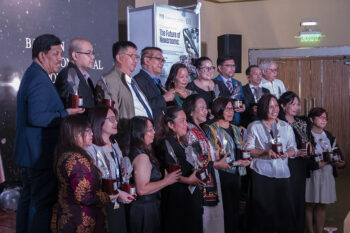I. Corruption Persisting
GENERAL SANTOS CITY (MindaNews / 23 January) – President Benigno Simeon C. Aquino III told the station managers of Radio Mindanao Network in Malacañang last January 10 that his government’s “relentless campaign against graft and corruption would continue” and warned “that one of the perceived ‘most corrupt’ government agencies ‘will get a very severe jolt’ in due time” without naming the agency. (The Philippine Star, January 12, 2013: Noy: Corrupt gov’t agency will get a severe jolt)
Speaking in Pilipino, he talked sounding very tough: “I cannot go into details but let me promise you that very soon one of the most perceived corrupt agencies will get a very severe jolt. We are preparing the necessary actions. Our prosecutors might have a hard time (going after them) if they get to hide the evidence.”
And warned: “But once and for all, we are no longer kidding when we appeal that they join the straight path. It seems they feel that they can disobey us and continue with their irregular activities. We are going to show them that they are mistaken.”
He was warning not only one government agency – the “most corrupt” – but all the government agencies, first, “to show that his administration was serious in fighting corruption” and, second, to belie “observations that government efforts to fight graft and corruption had not cascaded down to the lower levels of the bureaucracy”.
Admission
In issuing his “tough” warning the President admitted that:
(1) Graft and corruption persists in his government; so, the need for the “relentless campaign” to continue.
(2) There is a perception that his government is not serious in fighting corruption.
(3) There are observations that the efforts of his government to fight high-level corruption – more of the past as shown in the cases filed against his immediate predecessor, President Gloria Macapagal-Arroyo and her associates but less of the present as reflected in his warning against the “most corrupt” agency – have not gone down to “the lower levels of the bureaucracy”.
That after two and a half years of his presidency, such perceptions and observations concerning his fight against corruption persist should make him reexamine the truth behind the hype from his well funded media bureaus and agencies. And, part of that truth is whether his “tuwid na landas” (straight path) policy addresses the moral aspect of corruption. There are indicators – his “warning” above foremost – to raise doubts; the moral lies on his blind side.
Corruption
Webster’s Collegiate Dictionary, among other references, defines “corrupt” (verb), as “to change from good to bad in morals, manners or actions”; “corrupt” (adjective), as “morally degenerate and perverted”; and “corruption”, the noun derivative of “corrupt”, as “impairment of integrity, virtue or moral principle”. These are the first meanings.
Wikipedia essentially agrees with Webster’s in the meaning of corruption, stating: “In philosophical, theological, or moral discussions, corruption is spiritual or moral impurity or deviation from an ideal.”
In elucidating this meaning, Wikipedia identifies instances of corruption in general: “Corruption may include many activities including bribery and embezzlement.”
And, in particular, Wikipedia defines: “Government, or ‘political’, corruption occurs when an office-holder or other governmental employee acts in an official capacity for his or her own personal gain.”
To expand its definition, Wikipedia specifies three scales of corruption: (1) petty, “that occurs as small favours between a small number of people”; (2) grand, “that affects the government on a large scale”; and (3) systemic, “that is so prevalent that it is part of the every day structure of society”. It identifies sectors where corruption can occur: the economic, government or public, legislative, executive, and judiciary.
Wikipedia’s definition of government or political corruption” is clear. It should be noted, however, that in the Philippines such corruption must be in violation of law; without this element, an act or activity in “deviation from an ideal” is not corruption. Such “deviation” is not corruption if the act of a government official is justifiable by law, can be shown to be according to law or is not a specific violation of law.
In the Philippines, corruption is “violation of law”; but unless specified in law, clear “deviation from an ideal” or “impairment of integrity, virtue or moral principle” is not corruption.
Most Recently
Last month, employees and officials of local government units received gifts officially known as “performance enhancement incentives” or PEIs. There is nothing wrong with such gifts, especially during Christmas time. In the Congress, senators and members of the House received additional funds for miscellaneous operating and other expenses. There is nothing wrong with that if necessary. It is the manner the gifts and the funds were given that stinks.
The examples from Bukidnon LGUs, particularly, Valencia City and Bukidnon Province, (MindaNews, December 31, 2012: Bukidnon LGUs’ employee incentives: From P7,000 to P100,000) must not be isolated. PEIs are for all LGUs.
In Valencia City, the heads of offices and councilors received P100,000 each; regular employees, P70,000; casual employees, P60,000; job order or contractual employees, P7,000. These amounted to between P56 and P60 million.
In the provincial government, the regular and casual employees received P70,000 each; job order and casual employees, P35,000. The report did not mention the amount for the heads of offices and members of the Sangguniang Panlalawigan; however, this must be P100,000 or more.
These PEIs are legal. They are given to all “qualified government employees”, the amount depending on government savings. On the parts of the national government and government-owned or -controlled corporations, the amount is determined by the Department of Budget and Management; on the parts of the LGUs, by their respective sanggunians or legislative councils.
This year each employee of the national government received P5,000, regardless of rank or function (MindaNews, December 31,2010: Bukidnon LGUs …). In Valencia City and in the Bukidnon provincial government, the casual employees and higher received much more than their monthly salaries. [NOTE: Laborer 1, with Salary Grade 1, receives P9,649 under the July 17, 2009 revised Salary Standardization Law, fully implemented in 2012; the provincial governor, with Salary Grade 30, receives P85,230.]
In the Congress, the members received “additional MOOE (maintenance and other operating expenses)” – not bonuses, as officially clarified. In the Senate, 18 senators received P1.6 million each; four others, P250,000 each – the Senate President not including himself in the bonanza. In the House of Representatives, each member including the Speaker received P500,000 each.
The money was taken from the “savings” of both Houses – P29.8 million in the Senate; P141.5 million in the House of Representatives. As confirmed by the Commission on Audit, both the Senate President and the House Speaker have the power or discretion to disburse their Houses’ savings; they acted legally.
The Issue
The issue is not legality. The 1987 Constitution [VI.25(5)] allows the Senate President and the Speaker to realign their savings. The PEI is authorized under the Senate-House Joint Resolution No. 4 of July 17, 2009 [(4)(h)(ii)]; for the LGUs, this is spelled out in Section 4 of President Aquino III’s Administrative Order No. 4 and updated in Section 9 of the Department of Budget and Management Budget Circular No. 2012 – 3.
The issue is on the abuse of legality to cloak corruption. Involved here are big sums of the people’s money. Were the MOOEs and PEIs disbursed as honestly intended by law and with honest intentions by the officials given the discretion by law?
The Senate President and the Speaker have the discretion “to augment any item in the general appropriations law for their respective offices from savings in other items of their respective appropriations”. Was this discretion properly exercised?
The year had ended. What need was there to augment the 2012 MOOE? The 2013 operational expenses are provided in the 2013 MOOE. And, P1.6 million for each of 18 senators, P250,000 for four others and P500,000 for every member of the House! Some senators or members of the House told media they were going to spend their “additional MOOE” for purposes other than for the maintenance and operation of their offices.
Both AO No. 24 and BC 2012-3 provide: “LGUs shall exercise prudence in the use of local funds. In determining the amount of the PEI, the sanggunian shall ensure that the same is reasonable and that the expenditure will not, in any way, adversely affect the delivery of services to the public.”
As reported by MindaNews, the PEIs granted were much more than the one-month salaries of the employees. This might not have adversely affected the delivery of public services but was it “prudent” and “reasonable”? Savings reverted to the general funds could have been used to improve public services.
Grand but Legal
The abuse of discretion and power in the conversion of savings to MOOEs and PEIs is “grand” corruption. It is a deviation from the general principle that savings would revert to general funds or the treasury; it deprives the people of benefits from their own money in terms of more and better public services.
Here we see how the legal cloaks corruption to become an acceptable practice. “What is generally known and accepted is not necessarily considered as ethical,” said the former national treasurer Leonor Briones when asked by Philippine Daily Inquirer to comment on the “additional MOOE” last January10.
This discretion and power over savings date back to President Ferdinand E. Marcos as embodied in Article VIII, Section 16(5) of the 1972 Constitution and adopted in the 1987 Constitution Article VI, Section 25(5). And so is the practice of giving cash gifts to the employees of the national and local governments during Christmas under laws pursuant to Article 12-B, Section 6 of the 1972 Constitution.
But, per se, the grant of discretion and power is not corruption. It is the abuse of the discretion and power that is. Corollary to the abuse of discretion and power is the dishonesty in accumulating savings for the PEIs and realignment. We will discuss this later.
Can the Aquino III government stop the abuse? It can. The President can and he must in fulfillment of his “A Social Contract with the Filipino People”. It is sad to note that corruption as defined in Webster’s and in Wikipedia is on his blind side – just like any other president in the past.
(To Be Continued)
(“Comment” is Mr. Patricio P. Diaz’ column for MindaViews, the opinion section of MindaNews. The Titus Brandsma Media Awards recently honored Mr. Diaz with a “Lifetime Achievement Award” for his “commitment to education and public information to Mindanawons as Journalist, Educator and Peace Advocate.” You can reach him at patpdiazgsc@yahoo.com.)







